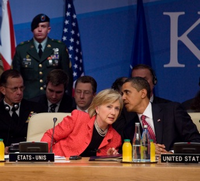STRASBOURG, France -- It's a virtual certainty that the concerto played by violinist Anne-Sophie Mutter at NATO's 60th anniversary dinner Friday night wasn't chosen because of its nickname. Mozart's Violin Concerto No. 5 is known as the "Turkish Concerto" because the composer used oriental themes in the final movement. But as it happened, the one discordant note in an otherwise harmonious summit was the down-to-the-wire threat by NATO member Turkey to veto the nomination of former Danish prime minister Anders Fogh Rasmussen as the alliance's new secretary general. It took frantic, behind-the-scenes efforts, which delayed the start of the Saturday conference, to avert the embarrassment of marking NATO's landmark birthday with a major internal disagreement. Turkey's objections to Rasmussen were based on his refusal to apologize three years ago after a Danish paper published cartoons depicting the Prophet Mohammed in an unflattering light. But another objection to Rasmussen was his skepticism over Ankara's application for EU membership. In the end, the joint efforts of President Barack Obama -- who was due in Turkey Monday -- and German Chancellor Angela Merkel overcame Turkish objections.
NATO Summit a Study in Contrasts

